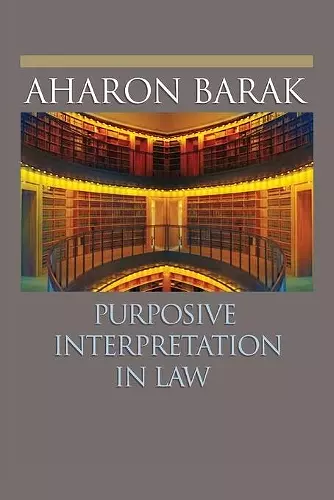Purposive Interpretation in Law
Aharon Barak author Sari Bashi translator
Format:Paperback
Publisher:Princeton University Press
Published:28th Sep '07
Currently unavailable, and unfortunately no date known when it will be back

This book offers a comprehensive--indeed magisterial--account of and argument for a more or less unified approach to the interpretation of legal items--rules, regulations, statutes, contracts, wills, trusts, and constitutions. Its thesis is novel and will generate both thought and controversy. That a judge of Aharon Barak's prominence has produced a work of such scholarly depth, jurisprudential insight, and care in research and documentation is itself a major accomplishment. -- Frederick Schauer, Frank Stanton Professor of the First Amendment, John F. Kennedy School of Government, Harvard University, author of "Playing by the Rules" and "Profiles, Probabilities, and Stereotypes" This book provides the carefully worked out and sifted results of concentrated thought by a leading judicial scholar and intellect on a topic of first importance to law. Justice Barak puts his approach, called 'purposive interpretation,' on display in elaborate detail that makes his presentation a formidable one. He is a deeply experienced, eminent judge with a deserved reputation for high intelligence, scholarship, wisdom, and reflectiveness about the work of judging--qualities plainly in evidence here. -- Frank I. Michelman, Robert Walmsley University Professor of Law, Harvard University, author of "Brennan and Democracy"
Presents a comprehensive theory of legal interpretation. This book argues that an alternative approach - purposive interpretation - allows jurists and scholars to approach all legal texts in a similar manner while remaining sensitive to the important differences.This book presents a comprehensive theory of legal interpretation, by a leading judge and legal theorist. Currently, legal philosophers and jurists apply different theories of interpretation to constitutions, statutes, rules, wills, and contracts. Aharon Barak argues that an alternative approach--purposive interpretation--allows jurists and scholars to approach all legal texts in a similar manner while remaining sensitive to the important differences. Moreover, regardless of whether purposive interpretation amounts to a unifying theory, it would still be superior to other methods of interpretation in tackling each kind of text separately. Barak explains purposive interpretation as follows: All legal interpretation must start by establishing a range of semantic meanings for a given text, from which the legal meaning is then drawn. In purposive interpretation, the text's "purpose" is the criterion for establishing which of the semantic meanings yields the legal meaning. Establishing the ultimate purpose--and thus the legal meaning--depends on the relationship between the subjective and objective purposes; that is, between the original intent of the text's author and the intent of a reasonable author and of the legal system at the time of interpretation. This is easy to establish when the subjective and objective purposes coincide. But when they don't, the relative weight given to each purpose depends on the nature of the text. For example, subjective purpose is given substantial weight in interpreting a will; objective purpose, in interpreting a constitution. Barak develops this theory with masterful scholarship and close attention to its practical application. Throughout, he contrasts his approach with that of textualists and neotextualists such as Antonin Scalia, pragmatists such as Richard Posner, and legal philosophers such as Ronald Dworkin. This book represents a profoundly important contribution to legal scholarship and a major alternative to interpretive approaches advanced by other leading figures in the judicial world.
"One of the most respected judges serving today is Aharon Barak, President of the Supreme Court of Israel. His commitment to the rule of law and constitutional rights, and his encyclopedic knowledge of the history, case law and principles of a wide variety of legal systems, are at the heart of Purposive Interpretation in Law. In this major work of legal philosophy, Barak develops a legal theory to explain how judges should resolve cases which depend on the interpretation of texts, whether contracts, statutes or constitutions."--David Pannick, QC, The Times (London) "Must reading for social scientists and legal theorists, as well as for jurists and other legal practitioners, who seek to witness the complexities of contemporary judicial decision-making... Barak has written a masterful book that will further the quest for a general theory of legal interpretation. And for this both scholars and practitioners should be thankful."--Ronald Kahn, Law and Politics Book Review "This book is a must-read for anyone interested in political theory and legal philosophy, but the specific areas of law that Barak so carefully investigates, make it relevant for private, public and comparative law academics and practitioners as well."--AlbertoVespaziani, European Legacy
ISBN: 9780691133744
Dimensions: unknown
Weight: 652g
448 pages